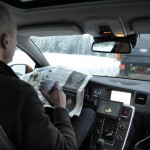 As driverless technology begins to establish a foothold in our lives, there have been various proclamations that the technology will change our relationship with cars, and quite probably reshape our cities.
As driverless technology begins to establish a foothold in our lives, there have been various proclamations that the technology will change our relationship with cars, and quite probably reshape our cities.
For instance, when cars drive themselves, we’ll surely no longer need to own our own car, with the amount of parking spaces falling in parallel.
Alas, a recent study by researchers at the University of Leeds, University of Washington and Oak Ridge National Laboratory, suggests that we will actually use cars much more when we no longer need to drive them ourselves, thus potentially negating any of these benefits.
Increasing our dependence on cars
One of the key benefits of driverless technology is the greater energy efficiency proposed by the improved traffic flow possible. The authors suggest, however, that when we can do so much more whilst on the move, it will encourage us to use our cars much more than we currently do.
“There is no doubt that vehicle automation offers several efficiency benefits, but if you can work, relax and even hold a meeting in your car that changes how you use it,” the authors say.
The researchers combine data on car and truck use with vehicle running costs and the potential uses for driverless technology to project how energy demand might change as a result of automation.
Energy benefits of automation
It identifies a number of efficiency benefits from driverless cars, including:
- more efficient driving styles, which could see a 20% reduction in energy use
- improved traffic flow, which could reduce energy usage by 4%
- the platooning of vehicles, whereby they travel very close to each other, thus creating aerodynamic savings of up to 25%
- a reduced likelihood of crashes meaning cars can be lighter, thus saving up to 23%
- a reduction in importance of performance, which could make cars 23% more efficient
The flip side
Alas, the study revealed that these benefits may be outweighed by a significant increase in vehicle usage. Indeed, we could start using cars so much more that it could consume up to 60% more energy than pre-automation.
“When you make a decision about transport, you don’t just think about the out-of-pocket costs of the train ticket or the car’s petrol; you also take into account non-financial costs,” the researchers say.
For instance, I might take the train to a meeting as it allows me to work as I travel, but if I can do that just as easily in a car, then that may be the easiest mode of transport to use.
There is also likely to be a significant increase in car usage by those that were previously shut out of car usage, such as the elderly or those with disabilities. This alone could see a rise of around 10% in energy use.
Other negative factors could be a rise in speed limits (because the cars are safer), but higher speeds are less efficient. There might even be more equipment used inside the cars, whether they be computers or televisions, which again could increase energy usage.
The impact on car sharing
What is less clear is the impact driverless technology could have on car ownership. It’s perfectly feasible that instead of owning a car, we will simply rent one for the duration of our journey, with the car chosen perfectly suited to that specific trip.
So, for instance, we wouldn’t have situations where a family have a large family car that is also used for single passenger trips to work or the shops. Better matching of car to journey could have an impact on energy efficiency.
“There is lots of hype around self-driving cars, much of it somewhat utopian in nature. But there are likely to be positives and negatives,” the authors say.
“By taking a clear-eyed view, we can design and implement policies to maximise the benefits and minimise the downsides of automated vehicles.
“Vehicle automation presents a paradox: it may encourage people to travel much more, but at the same time it makes it practical to implement tools such as road pricing that can offset those effects.
“Ultimately, however, it’s up to the government to set appropriate policies to manage these impacts.”
Overall, I suspect the environmental impact of driverless technology will be a positive one, but the study provides us with an interesting reminder that there may be costs as well as benefits.
That's actually a very interesting point. We always assume things will be better, but not always so.